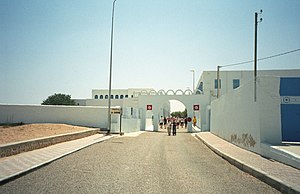
The 2002 Mombasa attacks were a two-pronged terrorist attack on 28 November 2002 in Mombasa, Kenya against an Israeli-owned hotel and a plane belonging to Arkia Airlines. An all-terrain vehicle crashed through a barrier outside the Paradise Hotel and blew up, killing 13 and injuring 80. At the same time, attackers fired two surface-to-air missiles at an Israeli charter plane. The Paradise Hotel was the only Israeli-owned hotel in the Mombasa area. The attacks were believed to be orchestrated by al-Qaeda operatives in Somalia in an attempt to disrupt the Israeli tourist industry on the African continent. Much speculation has occurred as to who the perpetrators are, but no complete list of suspects has been defined. The attack was the second al-Qaeda terrorist operation in Kenya, following the bombing of the U.S. embassy in Nairobi in 1998. Following the attack, the UN Security Council and other nations condemned the bombing.

Richard Colvin Reid, also known as the Shoe Bomber, is the perpetrator of the failed shoe bombing attempt on a transatlantic flight in 2001. Born to a father who was a career criminal, Reid converted to Islam as a young man in prison after years as a petty criminal. Later he became radicalized and went to Pakistan and Afghanistan, where he trained and became a member of al-Qaeda.
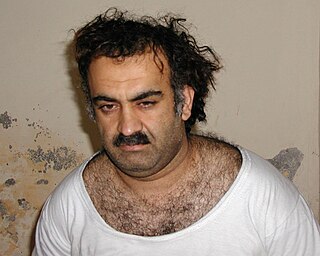
Khalid Sheikh Mohammed, often known by his initials KSM, is a Pakistani terrorist, mechanical engineer and the former Head of Propaganda for al-Qaeda. He is currently held by the United States at the Guantanamo Bay detention camp under terrorism-related charges. He was named as "the principal architect of the 9/11 attacks" in the 2004 9/11 Commission Report.
In 2001, a network of interconnected terrorist cells in France, Belgium, and the Netherlands was uncovered by law enforcement. The network had connections to al-Qaeda and was planning to commit one or more bombings.
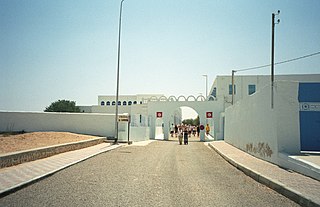
The Ghriba synagogue bombing was carried out by Niser bin Muhammad Nasr Nawar on the El Ghriba synagogue in Tunisia in 2002.

The ancient El Ghriba Synagogue, also known as the Djerba Synagogue, is located on the Tunisian island of Djerba. It is situated in the Jewish village of Hara Seghira, several kilometres southwest of Houmt El Souk, the main town of Djerba.
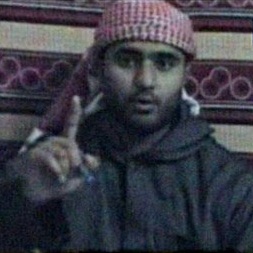
Mohammad Sidique Khan was a British Pakistani terrorist and the oldest of the four Islamist suicide bombers and believed to be the leader responsible for the 7 July 2005 London bombings, in which bombs were detonated on three London Underground trains and one bus in central London, suicide attacks, killing 56 people including the attackers and injuring over 700. Khan bombed the Edgware Road train, killing himself and six other people.
A suicide bomber detonated a car bomb outside the lobby of the JW Marriott Jakarta hotel on 5 August 2003, killing 12 people and injuring 150. Those killed included 11 Indonesians and one Dutch national. The hotel was viewed as a Western symbol, and had been used by the United States embassy for various events. The hotel was closed for five weeks and reopened to the public on 8 September 2003.
Christian Ganczarski is a German terrorist who was alleged to be a top Al-Qaeda leader.
The following is a list of attacks which have been carried out by Al-Qaeda.

An Islamist insurgency is taking place in the Maghreb region of North Africa, followed on from the end of the Algerian Civil War in 2002. The Algerian militant group Salafist Group for Preaching and Combat (GSPC) allied itself with al-Qaeda to eventually become al-Qaeda in the Islamic Maghreb (AQIM). The Algerian and other Maghreb governments fighting the militants have worked with the United States and the United Kingdom since 2007, when Operation Enduring Freedom – Trans Sahara began.
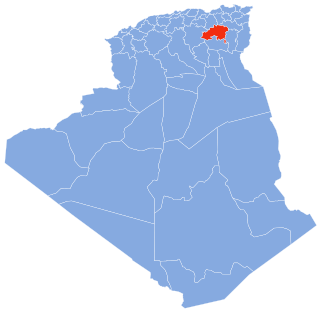
The 2007 Batna bombing took place on 6 September 2007 in Batna, a town in Batna Province, eastern Algeria.
Carried out by the Egyptian Islamic Jihad, the 19 November 1995 attack on the Egyptian embassy in Islamabad, Pakistan was retaliation against the diplomatic staffers who were accused of gathering intelligence on Jihad factions inside Pakistan. It was the deadliest attack against the Egyptian government, since it had been declared apostate three years earlier by Islamic militants.
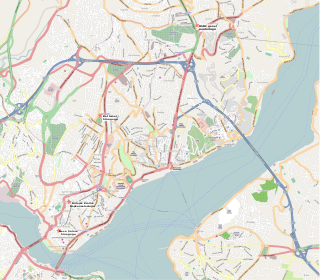
The 2003 Istanbul bombings were a series of suicide attacks carried out with trucks fitted with bombs detonated at four different locations in Istanbul, Turkey, on 15 and 20 November 2003.
On October 29, 2010, two packages, each containing a bomb consisting of 300 to 400 grams (11–14 oz) of plastic explosives and a detonating mechanism, were found on separate cargo planes. The bombs were discovered as a result of intelligence received from Saudi Arabia's security chief. They were in transport from Yemen to the United States and were discovered at stopover locations: one at East Midlands Airport in the UK and one in Dubai in the United Arab Emirates.

A propane bomb is a type of improvised explosive device which uses commercially available bottled gas cylinders, a kind of BLEVE. The devices have been used in terror attacks and school bombing plots.
The Abu Hafs al-Masri Brigades, or Abu Hafs al-Masri Battalions, is a group which claims to be a branch of the Islamic fundamentalist organisation Al-Qaeda.

The Chaambi Operations, or Battle of Chaambi were part of the insurgency in the Maghreb. In December 2012, the Tunisian Army launched an offensive against the Salafist jihadists in Jebel ech Chambi near Kasserine. The conflict ended with the victory of the Tunisian Army in 2019.

A suicide bombing took place on 26 June 2015 at a Shia mosque in Kuwait. The Islamic State of Iraq and the Levant claimed responsibility for the attack. Sabah al-Sabah, the Emir at the time, arrived at the location of the incident after a short period of time. Twenty-seven people were killed and 227 people were wounded.

On 18 January 2017, a suicide bomber drove a vehicle filled with explosives into a military camp near Gao, Mali, killing 77 people and injuring at least 115. The incident is the deadliest terrorist attack in Malian history.
